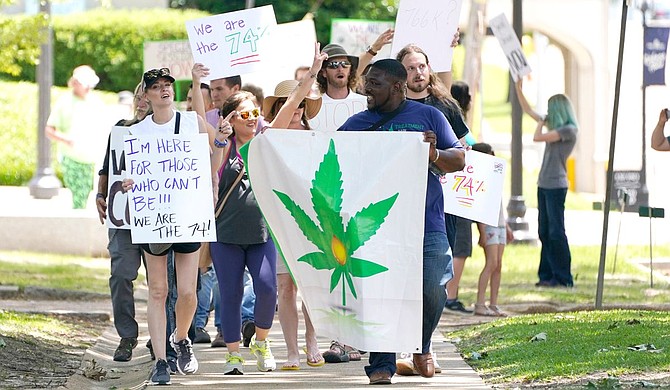Mississippi House and Senate negotiators said Thursday that they have agreed on a proposed medical marijuana program. Photo courtesy Rogelio V. Solis via AP
JACKSON, Miss. (AP) — Mississippi House and Senate negotiators said Thursday that they have agreed on a proposed medical marijuana program. Leaders are expected to ask Republican Gov. Tate Reeves to call the Legislature into session to put the plan into law.
The step comes months after the Mississippi Supreme Court tossed out a medical marijuana initiative that voters approved last November. Justices ruled in May that Mississippi's initiative process was out of date and the medical marijuana proposal was not properly on the ballot.
The legislative proposal is not identical to the voter-approved initiative. The proposal would allow local governments to limit where the marijuana could be grown, processed or sold. That was not in Initiative 65.
The two lead negotiators — Republican Sen. Kevin Blackwell of Southaven and Republican Rep. Lee Yancey of Brandon — said Thursday that passing a bill would take a three-fifths majority because of tax provisions, and leaders of the House and Senate believe they have have enough votes lined up.
Yancey said the proposed program would help people with debilitating illnesses such as epilepsy, multiple sclerosis or cancer.
“This is compassionate relief,” Yancey said. “This is not a recreational thing.”
Yancey said that if the bill becomes law, cities and counties would be have 90 days to opt out of allowing medical marijuana growing sites, processing facilities and dispensaries. But if local governing boards decide to do so, voters could petition for an election to overturn that decision.
Blackwell said if a city or county opts out of allowing facilities, people who live in those places would still be able to possess and use medical marijuana.
Blackwell said negotiating details of the bill was a long process.
“It's not a perfect bill, by any stretch of the imagination,” he said.
Some details:
— Marijuana for medicinal use could only be grown indoors.
— The state Department of Agriculture would be in charge of licensing and regulating businesses that grow, process or transport the products. Agriculture Commissioner Andy Gipson has said he does not want the department to have that role as long as marijuana is illegal under federal law. Yancey said the Agriculture Department could set a contract with another entity, such as the Board of Pharmacy, to handle the duties.
— The state Department of Health would regulate medical marijuana testing facilities and research facilities. It also would license the physicians, physician assistants, nurse practitioners and optometrists who recommend medical marijuana for patients. The Health Department also would license patients who receive medical marijuana and the caregivers who might need to buy it for them. The license for a patient or caregiver would cost $25 a year, and each caregiver also would pay $37 for an annual criminal background check.
— The Department of Revenue would regulate dispensaries.
— Cultivation businesses, where the plants are grown, would have to have at least some owners who are Mississippi residents.
— One person or business could own no more than one cultivation site, one processing site and five dispensaries.
— Medical marijuana could be smoked, used in products such as creams or drops or used in food products such as gummies or drinks. Limits would be set on how many one person could obtain in a month.



Comments
Use the comment form below to begin a discussion about this content.
comments powered by Disqus